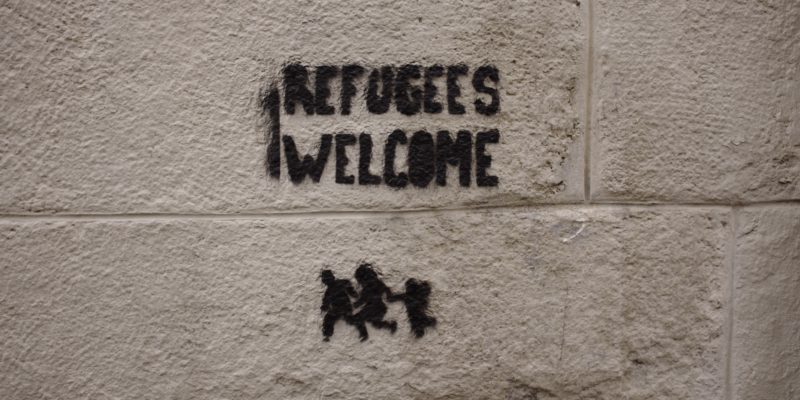1. Belgian authorities admit two-year-old girl was shot after police chase in Mons
A two-year-old girl was killed in Mons, Belgium, after police opened fire on a van carrying migrants (26 adults and 3 more children). Prosecutors had initially denied that the police was involved, claiming the child died as a result of an accident. They are now admitting that the girl suffered a gunshot wound to the face, confirming the accounts of her Kurdish-Iraqi parents who were travelling with her, as well as those of several passers-by who had witnessed the chase.
Police claimed they opened fire on the van in an effort to stop it from reaching the UK. An internal investigation has been opened. The Dunkirk Refugee Women’s Centre, on behalf of the community of Grande-Synthe (we wrote about them here), has published a post in her memory.
2. Review Commission of Ragusa court confirms Libya is not a safe harbour
The case against Italy on behalf of the survivors and relatives of the victims of the November 2017 shipwreck has been brought before the European Court of Human Rights. Now the Review Commission of the Ragusa Court has upheld the decision to release the impounded Spanish NGO ship Open Arms. The court has rejected the prosecution’s appeal, and its decision confirms the ruling of the Catania judge who ordered the release of the ship: “Libya is not a safe harbour as defined by international law.”
3. EU policies fuel surge in detention of migrants and refugees in Libya
At least 7,000 migrants and refugees are languishing in Libyan detention centres where abuse is rife. A sharp increase from March when there were 4,400 detained. “The EU is turning a blind eye to the suffering caused by its callous immigration policies that outsource border control to Libya,” said Heba Morayef, Amnesty International’s Middle East and North Africa Director. The surge in detention of migrants and refugees is directly linked to the EU policies of support to Libya. Italy in particular has provided the Libyan Coast Guard with equipment, speedboats and training, before handing over the coordination of rescue operations in international waters.
4. A new fact checking on immigration by ISPI
The Italian institute for international political studies has published a new fact checking (which updates and integrates the one from last year) with quantitative data on the drop in the number of arrivals, the sustainability of the asylum system, the number of deaths at sea, NGO rescue efforts, the EU policies, and much more.
5. Exploitation of female Romanian farm workers brought to the European Parliament
Hundreds of women migrated from Romania to the Sicilian farms found themselves enslaved and sexually exploited. The issue has now been brought to the European Parliament. Meanwhile, the Romanian parliament has drafted an amendment which has the potential to improve the integration process for persons granted international protection: the duration of integration programme for beneficiaries is prolonged from 6 months to 12 months and the bill also prescribes additional housing possibilities.
6. A Swiss decision sets a dangerous precedent in Israel
A controversial Swiss decision to review the status of 3,200 Eritrean asylum seekers may have dangerous consequences in Israel, where it has been cited as a precedent for returning Eritreans to their country, researcher Shani Bar-Tuvia wrote in News Deeply.
7. Financial inclusion of migrants is improving in Italy
Financial inclusion opens up spaces for economic citizenship, and it speeds up and facilitates social inclusion for new Italian citizens. The National Observatory on the Financial Inclusion of Migrants has just published its
sixth annual report. The data show that 75 per cent of immigrant citizens in Italy has a bank account, compared to just above 61 per cent in 2010 (read the complete report here).
8. Appeals process for rejected applications will be shortened under Greece’s new asylum legislation
On May 15, Greece’s parliament approved new legislation, designed to speed up the asylum process and reduce the migratory pressure on the Aegean islands. Human rights groups promptly accused the Greek government of “ignoring refugee rights“: the most contested parts are travel restrictions on asylum seekers and the risk of deportation for rejected applicants. Meanwhile, in Patras, dozens of young migrants attempt to leave on boats every day to reach Italy, while our country silently keeps pushing them back.
9. A surge in migrant arrivals from Tunisia to Italy
While migrant flows from Libya have dropped by 85% thanks to the memorandum of understanding with Italy, data released by the Ministry of Interior have confirmed a considerable increase in the number of arrivals from Tunisia: with more than 2,000 in the first months of 2018. Lampedusa in particular saw three arrivals in three days, with 160 people in the last one. The migrants were transferred to the island’s hotspot, which had been officially closed in March because of its poor living conditions.
10. Insieme Senza Muri opens in Milan
Sunday May 20 saw the opening of Casa Chiaravalle and the launch of Insieme Senza Muri, a month of events and meetings against racism and for integration organised by the City of Milan with all the immigrant communities, just like the big parade of 2017. Casa Chiaravalle is the largest property seized from the mafia in Milan, and it will now be the home to a special project for family sponsorship for women.
Foto di copertina di Nicolas Vigier (CC BY-NC 2.0)









